Dental implant surgery is a significant procedure, and proper post-operative care is crucial for successful healing. A key component of this care involves adhering to a soft food diet for several weeks to minimize discomfort and prevent complications. This comprehensive guide provides 50 soft food ideas to nourish your body while protecting your healing implants. Remember to always consult your dentist or oral surgeon for personalized dietary recommendations based on your specific situation.
Understanding the Need for a Soft Food Diet
After dental implant surgery, your mouth will be sensitive and sore. Chewing hard or crunchy foods can disrupt the healing process, potentially leading to infection or implant failure. A soft food diet helps minimize trauma to the surgical site, allowing for faster and more comfortable healing. This doesn't mean you need to subsist on bland meals! With a little creativity, you can enjoy a variety of nutritious and delicious soft foods.
50 Soft Food Ideas for Post-Dental Implant Surgery Recovery
This list is categorized for easier navigation. Remember to consume foods at a lukewarm temperature to avoid further irritation.
Dairy & Eggs:
- Scrambled eggs (well-cooked)
- Omelets (with soft fillings)
- Yogurt (plain or flavored)
- Mashed potatoes with milk and butter
- Cottage cheese
- Milk shakes (made with soft fruits)
- Pudding (chocolate, vanilla, etc.)
- Custard
- French toast (soaked thoroughly)
- Cheese soufflé
Fruits & Vegetables:
- Applesauce (unsweetened)
- Bananas (mashed or sliced)
- Avocado (mashed)
- Mango (pureed or very ripe)
- Peaches (canned or cooked)
- Pears (cooked or pureed)
- Cooked carrots (mashed or pureed)
- Cooked sweet potatoes (mashed)
- Steamed broccoli (very well-cooked)
- Cooked spinach (pureed)
Soups & Broths:
- Cream of mushroom soup
- Cream of tomato soup
- Chicken noodle soup (noodle size is important; choose small or broken noodles)
- Vegetable broth
- Lentil soup (pureed)
- Butternut squash soup
Grains & Starches:
- Oatmeal (cooked until very soft)
- Rice pudding
- Mashed sweet potatoes
- Cooked pasta (well-cooked and soft)
- Quinoa (cooked until very soft)
- Cream of wheat
Protein Sources:
- Smoothies (with protein powder)
- Ground meat (very well-cooked)
- Fish (flaked and cooked)
- Tofu (soft and well-cooked)
- Chicken salad (shredded and well-cooked)
- Tuna salad (well-drained)
Other Soft Foods:
- Refried beans
- Soft-cooked lentils
- Well-cooked polenta
- Pancakes (soaked in syrup)
- Waffles (soaked in syrup)
- Yogurt parfait
- Smoothies with fruits and vegetables
- Milkshakes
- Popsicles (avoid acidic ones)
- Jell-O
- Ice cream (in moderation)
- Well-cooked vegetables like squash or pumpkin
Frequently Asked Questions (FAQs)
How long should I eat a soft food diet after dental implant surgery?
The duration of a soft food diet varies depending on the complexity of your procedure and your individual healing progress. Typically, it ranges from one to three weeks. Your dentist will provide specific instructions tailored to your case.
What foods should I avoid after dental implant surgery?
Avoid hard, crunchy, or chewy foods that require excessive chewing, such as nuts, seeds, popcorn, raw vegetables, and tough meats. Also, steer clear of extremely hot or cold foods, which can irritate the surgical site. Acidic foods and beverages can also cause discomfort.
Can I drink through a straw after dental implant surgery?
Using a straw is generally discouraged after dental implant surgery as the sucking motion can dislodge blood clots and delay healing. It is best to drink fluids directly from a cup or glass.
What if I experience pain while eating soft foods?
If you experience significant pain while eating, even soft foods, contact your dentist or oral surgeon immediately. They can assess the situation and provide appropriate advice or pain management.
This comprehensive guide provides a variety of soft food options to make your post-surgical recovery more comfortable and ensure your implants heal successfully. Remember, proper nutrition is essential for healing, so prioritize consuming these foods while following your dentist's instructions carefully. A successful recovery is well within your reach with the right approach!
